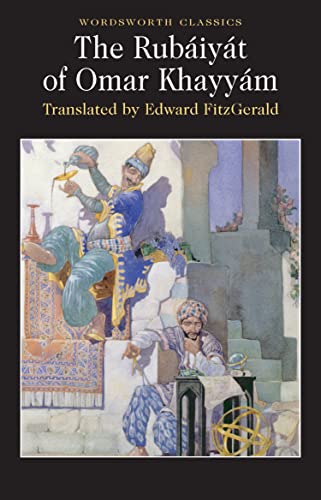
Inhaltsangabe
In the renowned translation by Edward FitzGerald, with an introduction by Professor Cedric Watts.
Here is Edward FitzGerald’s original translation of the Rubáiyát, the collection of poems attributed to the Persian astronomer and mathematician, Omar Khayyám. FitzGerald’s distinctive version (1859), with its oriental imagery and sensual warmth, made an exotic appeal to the Victorian imagination. Its scepticism fitted a time of increasing religious doubt; its romantic melancholy resonated with the writings of Matthew Arnold and Thomas Hardy; and its epicureanism heralded the Aesthetic Movement.
It has inspired composers, rock groups, artists and film-makers. As rendered by FitzGerald, the Rubáiyát remains a seductively subversive poem.
Die Inhaltsangabe kann sich auf eine andere Ausgabe dieses Titels beziehen.
Reseña del editor
In the renowned translation by Edward FitzGerald, with an introduction by Professor Cedric Watts. Here is Edward FitzGerald's original translation of the Rubaiyat, the collection of poems attributed to the Persian astronomer and mathematician, Omar Khayyam. FitzGerald's distinctive version (1859), with its oriental imagery and sensual warmth, made an exotic appeal to the Victorian imagination. Its scepticism fitted a time of increasing religious doubt; its romantic melancholy resonated with the writings of Matthew Arnold and Thomas Hardy; and its epicureanism heralded the Aesthetic Movement. It has inspired composers, rock groups, artists and film-makers. As rendered by FitzGerald, the Rubaiyat remains a seductively subversive poem.
Reseña del editor
This edition presents the classic free translation by Edward Fitzgerald of the great Persian poem by the 12th century astronomer and poet - Omar Khayy?m. Fitzgerald's masterful translation was first published as an anonymous pamphlet in 1859. Its colourful, exotic and remote imagery greatly appealed to the Victorian age's fascination with the Orient, while its luxurious sensual warmth acted as a striking counterpoint to the growth of scientific determinism, industrialisation and the soulless Darwinian doctrine of the survival of the fittest. Greatly praised by Dante Gabriel Rossetti, Swinburne, Ruskin and William Morris, the romantic melancholy of the poem anticipates the poetry of Matthew Arnold and Thomas Hardy, while its epicurean motifs link it to the Aesthetic Movement
„Über diesen Titel“ kann sich auf eine andere Ausgabe dieses Titels beziehen.
Suchergebnisse für The Rubáiyát of Omar Khayyám (Wordsworth Classics)
The Rubaiyiat of Omar Khayyam (Wordsworth Classics)
Anbieter: BooksRun, Philadelphia, PA, USA
Paperback. Zustand: Fair. New ed. The item might be beaten up but readable. May contain markings or highlighting, as well as stains, bent corners, or any other major defect, but the text is not obscured in any way. Bestandsnummer des Verkäufers 1853261874-7-1
The Rubaiyiat of Omar Khayyam (Wordsworth Classics)
Anbieter: Orion Tech, Kingwood, TX, USA
paperback. Zustand: Fair. Bestandsnummer des Verkäufers 1853261874-4-32864988
The Rubaiyiat of Omar Khayyam (Wordsworth Classics)
Anbieter: Books-FYI, Inc., Cadiz, KY, USA
paperback. Zustand: Good. Bestandsnummer des Verkäufers 23MA3O00NXRE_ns
The Rubaiyiat of Omar Khayyam (Wordsworth Classics)
Anbieter: Wonder Book, Frederick, MD, USA
Zustand: Very Good. Very Good condition. A copy that may have a few cosmetic defects. May also contain light spine creasing or a few markings such as an owner's name, short gifter's inscription or light stamp. Bundled media such as CDs, DVDs, floppy disks or access codes may not be included. Bestandsnummer des Verkäufers B11B-02374
The Rub?iy?t of Omar Khayy?m
Anbieter: ThriftBooks-Phoenix, Phoenix, AZ, USA
Paperback. Zustand: Good. No Jacket. Pages can have notes/highlighting. Spine may show signs of wear. ~ ThriftBooks: Read More, Spend Less. Bestandsnummer des Verkäufers G1853261874I3N00
The Rub?iy?t of Omar Khayy?m
Anbieter: ThriftBooks-Dallas, Dallas, TX, USA
Paperback. Zustand: Good. No Jacket. Pages can have notes/highlighting. Spine may show signs of wear. ~ ThriftBooks: Read More, Spend Less. Bestandsnummer des Verkäufers G1853261874I3N00
The Rub?iy?t of Omar Khayy?m
Anbieter: ThriftBooks-Atlanta, AUSTELL, GA, USA
Paperback. Zustand: Very Good. No Jacket. May have limited writing in cover pages. Pages are unmarked. ~ ThriftBooks: Read More, Spend Less. Bestandsnummer des Verkäufers G1853261874I4N00
The Rubaiyat of Omar Khayyam
Anbieter: Better World Books: West, Reno, NV, USA
Zustand: Good. Used book that is in clean, average condition without any missing pages. Bestandsnummer des Verkäufers GRP13199575
The Rubaiyat of Omar Khayyam
Anbieter: Better World Books, Mishawaka, IN, USA
Zustand: Good. Used book that is in clean, average condition without any missing pages. Bestandsnummer des Verkäufers GRP13199575
The Rubáiyát of Omar Khayyám (Wordsworth Classics)
Anbieter: WeBuyBooks, Rossendale, LANCS, Vereinigtes Königreich
Zustand: Good. Most items will be dispatched the same or the next working day. A copy that has been read but remains in clean condition. All of the pages are intact and the cover is intact and the spine may show signs of wear. The book may have minor markings which are not specifically mentioned. Bestandsnummer des Verkäufers wbb0023567455
Gebraucht kaufen
Anzahl: 1 verfügbar
